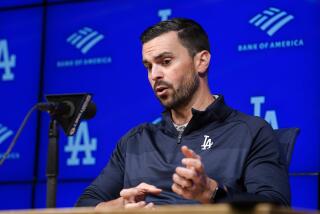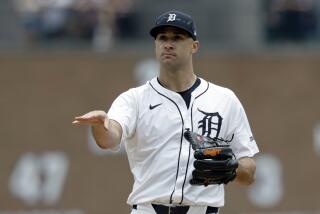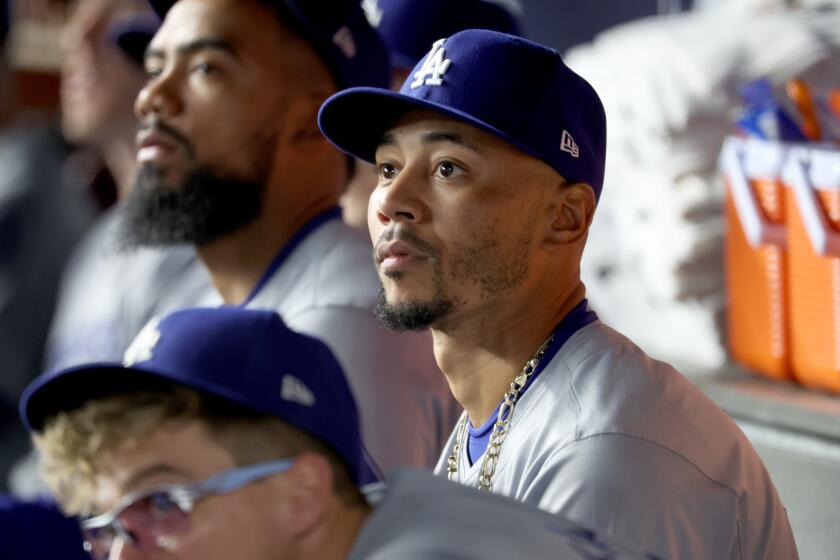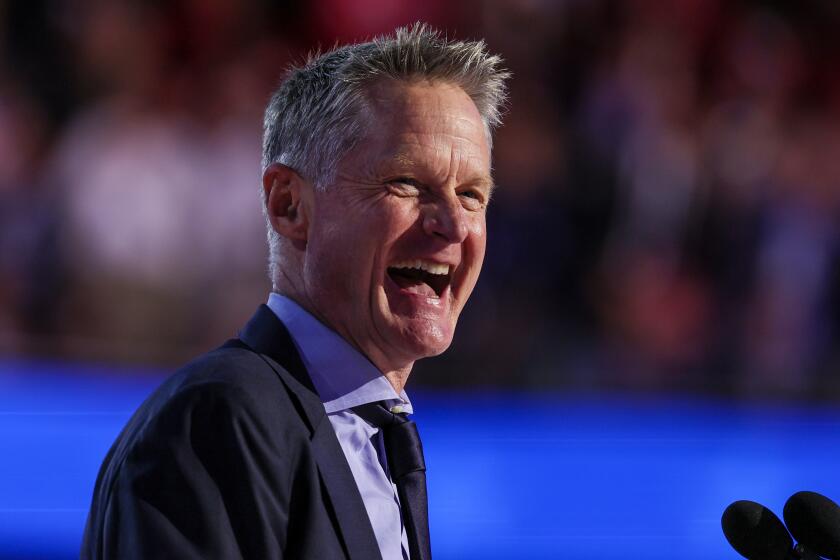Trade-deadline work is a big deal for Dodgers’ Ned Colletti
Inside the press box at triple-A Albuquerque two weeks ago, Dodgers General Manager Ned Colletti closed all the doors and windows, activated his cell phone to speaker mode and launched an impromptu conference call.
With Colletti were Dodgers President Stan Kasten and assistant general manager De Jon Watson. Special assistant Rick Ragazzo, player personnel director Vance Lovelace and director of contracts Alex Tamin were on connecting lines.
The news that brought them together: Ragazzo had learned that the Miami Marlins were willing to trade star infielder Hanley Ramirez.
About 49 hours later, Ramirez was a Dodger, along with left-handed reliever Randy Choate.
“Scouting is a business where you hear a lot sitting with those other guys all game,” Colletti said. “The good ones are there not just to watch the game, but to gather information. Rick … knows who has accurate info., who is close to their general manager.”
Colletti was on the phone with Marlins General Manager Mike Hill the next day. And two nights after the conference call, the deal was being finalized. But not until Colletti scrambled some more.
Working his phone tirelessly in speaking with Ramirez, the player’s agent and to arrange the necessary trade paperwork, Colletti let the battery in his cell phone drain. It died inside an Albuquerque restaurant, but Colletti was fortunate to find a customer who had a charger. After 30 minutes plugged into an electrical outlet, the phone had enough juice to last the final hours of navigating the trade process.
“I have since acquired a spare cell phone battery,” Colletti quipped.
Baseball’s trade deadline is rife with such chaos, and it’s often difficult to determine what’s real and what’s merely rumor.
During the Angels’ weekend homestand before the trade deadline, Angels General Manager Jerry Dipoto was asked whether he could give an update on any trade talks that might be going on inside his office. He divulged nothing.
“You have the most difficult job in the world, trying to make sense of that,” Dipoto said.
There’s a lot to keep track of — for everyone involved.
Colletti said the Dodgers spoke to about 30 people in the final 90 minutes before Tuesday’s 1 p.m. PDT deadline. And that was after he had acquired Seattle reliever Brandon League and veteran leadoff hitter and outfielder Shane Victorino from the Philadelphia Phillies in the previous 24 hours.
There are stages to the process, Colletti said, starting with a mid-July summit with scouts to have specific, deep conversations about the team’s prospects while firming up a list of available players on other teams.
“You talk to your scouts who really know a player — is he healthy, laboring, hurting?” Colletti said. “We keep a board with all the thought processes, all the ideas factored in — the players they’d need back, their contracts.”
The Dodgers have swung two recent deals with Philadelphia — they picked up veteran pitcher Joe Blanton on Friday — and Colletti has a personal connection with Phillies General Manager Ruben Amaro Jr., who he has known for years, since Amaro’s father and Colletti worked for the Chicago Cubs.
“You can have a three-hour meeting with someone but only 60 seconds of it might tell you the story, what the hot button is, what the need is,” Colletti said.
Colletti sensed Philadelphia would deal Victorino, but would need a reliever back. He checked with Amaro Jr. on July 26, the eve of the Phillies’ pivotal trip to Atlanta, and was told he wasn’t ready to deal yet. But, Colletti said Amaro added, “I won’t make a deal before I talk to you.”
Noting that Philadelphia lost twice to the Braves, falling further in the National League East standings, Colletti acquired League on Monday, providing the Dodgers the flexibility to package reliever Josh Lindblom with a minor league pitching prospect for Victorino on Tuesday.
“You have to match up,” Colletti said. “It’s complicated, there can be a lot of moving parts. You have to stay focused, have a lot of conversation.”
Still, the Victorino deal stalled around 2 a.m. PDT Tuesday, with the parties agreeing to “mull it over” and revisit it when the sun rose.
Colletti set two alarm clocks when he returned home, and awoke before each rang at 5 a.m. He said the hysterical texting and phone calls between he and Amaro as the deadline loomed would have made great reality television.
“I don’t know if it’s insane or not,” Colletti said. “It’s what we do.”
twitter.com/latimespugmire
More to Read
Go beyond the scoreboard
Get the latest on L.A.'s teams in the daily Sports Report newsletter.
You may occasionally receive promotional content from the Los Angeles Times.











